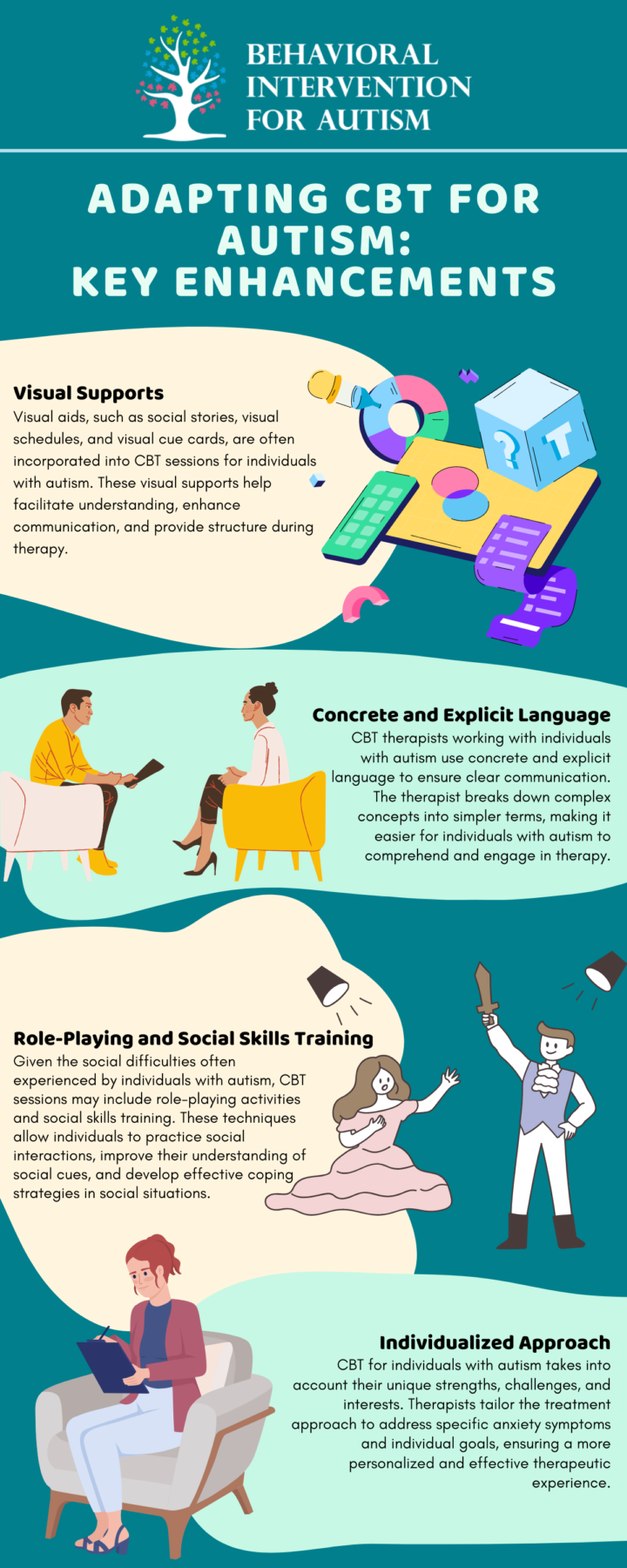
Table of Contents
Autism and anxiety frequently occur together, making it crucial to understand their relationship in order to offer the right support and treatment. Recognizing how anxiety impacts individuals with autism helps in tailoring interventions that address both conditions effectively.
Prevalence of Anxiety in Autism
As many as 80% of children with autism spectrum disorders (ASDs) experience anxiety that is clinically significant. This high prevalence is also seen in adults, with about 40% of youth and up to half of adults with autism meeting the clinical criteria for an anxiety disorder. These rates are significantly higher than the anxiety rates in individuals without autism. The most common types of anxiety disorders observed in children with ASD include specific phobias, social anxiety disorder/agoraphobia, obsessive-compulsive disorder (OCD), generalized anxiety disorder (GAD), separation anxiety disorder (SAD), and panic disorder.
Treatment Approaches for Anxiety
Managing anxiety in individuals with autism involves a range of treatment approaches that can significantly alleviate symptoms and enhance overall well-being. Cognitive-behavioral therapy (CBT) and medication are two primary options for addressing anxiety in autism. CBT focuses on changing negative thought patterns and behaviors, while medication can help manage symptoms more directly. Both methods offer valuable strategies for improving quality of life and are often used in combination for optimal results.
Cognitive-Behavioral Therapy (CBT) for Autism
Cognitive-Behavioral Therapy (CBT) has emerged as a promising approach for addressing anxiety in individuals with autism. This therapy combines talk therapy with behavioral strategies to help individuals identify triggers, develop coping skills, and face anxiety-provoking situations.
Efforts have been made to adapt CBT to meet the unique needs of individuals with autism, considering their communication and social challenges. These adaptations aim to make CBT more accessible and effective for individuals on the autism spectrum. Some key adaptations include:

Effectiveness of CBT in Managing Anxiety
Research has shown that CBT is an effective treatment for managing anxiety in individuals with autism. Studies have found that CBT can significantly reduce anxiety symptoms and improve overall well-being in individuals with Asperger’s syndrome and autism.
Moreover, CBT has been categorized as a ‘well-established’ treatment for anxiety in typically developing youths and adults, demonstrating its efficacy in reducing anxiety symptoms in the general population. Although modifications to CBT have been tested to address the unique challenges of autism, the success in reducing anxiety symptoms in youth with autism has been moderate.
Combining talk therapy, behavioral strategies, and targeted adaptations, CBT equips individuals with autism to better understand and manage their anxiety. It empowers them to develop coping skills, challenge negative thoughts, and navigate anxiety-provoking situations more effectively.
It is important to note that CBT may not be suitable for everyone, and individual needs should be assessed to determine the most appropriate treatment approach. Consulting with a qualified mental health professional who specializes in working with individuals with autism can help determine the best course of action and tailor therapy to meet specific needs.
Medication Options for Anxiety in Autism
For individuals with autism who experience anxiety, medication can be a beneficial option to help manage their symptoms. It is important to work closely with a pediatric psychiatrist to ensure that children are taking appropriate medications for their condition and age. There are two main types of medications commonly used to address anxiety in autism: selective serotonin-reuptake inhibitors (SSRIs) and anti-anxiety medications.
Selective Serotonin-Reuptake Inhibitors (SSRIs)
Selective serotonin-reuptake inhibitors (SSRIs) are a class of antidepressant medications that have also been found to be effective in reducing anxiety symptoms. Some studies have shown that SSRIs like fluvoxamine, fluoxetine, and sertraline are superior to placebos in reducing anxiety symptoms in youths and adults without autism spectrum disorders (ASDs).
These medications function by elevating serotonin levels, a neurotransmitter that helps regulate mood and anxiety. SSRIs can reduce anxiety symptoms in individuals with autism by boosting serotonin activity in the brain.
Anti-Anxiety Medications
In addition to SSRIs, there are other medications available to address anxiety in individuals with autism. Anti-anxiety medications such as Xanax, Buspar, Niravam, Valium, Ativan, and Vivitrol may be prescribed to manage anxiety symptoms. These medications targets different neurotransmitters in the brain to reduce feelings of anxiety and promote a sense of calm.
It is important to note that the response to medication can vary from person to person. While some individuals with autism may show improvement in anxiety symptoms when taking antidepressants like citalopram (Celexa) or anti-anxiety drugs like buspirone (Buspar), others may not benefit from certain medications such as fluvoxamine (Luvox). Additionally, it is essential to be aware of potential side effects, which can range from mild to severe, and should be closely monitored.
Decisions about medication options for anxiety in adults with autism should be made on a case-by-case basis, taking into consideration the individual’s specific needs and response to treatment. Some studies have suggested that Luvox may help with obsessive-compulsive behavior, while fluoxetine (Prozac) may be beneficial for anxiety in adults with autism.
Treating anxiety in children with autism often begins with a low dose of medication, which is then gradually increased while closely monitoring the child’s reactions. This cautious approach is recommended because children with autism can be particularly sensitive to potential side effects.
In conjunction with medication, it is important to consider other treatment approaches such as therapy and behavioral interventions to provide comprehensive support for individuals with autism and anxiety. Working closely with healthcare professionals can help determine the most appropriate course of action for managing anxiety symptoms in individuals with autism.
Considerations for Medication Use
Managing anxiety in individuals with autism often involves considering medication as a beneficial option. It’s essential to collaborate with a pediatric psychiatrist to ensure that the prescribed medications are tailored to the individual’s specific condition and age. Several important factors must be considered regarding medication use for anxiety in autism.

Working with Pediatric Psychiatrists
Collaborating with a pediatric psychiatrist is essential for determining the most suitable medication options for anxiety in individuals with autism. Pediatric psychiatrists are specialized in understanding the unique needs of children with autism and can provide expert guidance on medication choices. They will consider factors such as the individual’s medical history, current symptoms, and any potential interactions with other medications.
During the consultation with a pediatric psychiatrist, it is crucial to provide detailed information about the individual’s symptoms and experiences. This will help the psychiatrist make an informed decision about the appropriate medication and dosage. Additionally, it is important to discuss any concerns or potential side effects associated with the medication.
Monitoring and Adjusting Medications
Once a medication is prescribed, close monitoring is necessary to ensure its effectiveness and minimize any adverse effects. Pediatric psychiatrists typically start with a low dose of medication and gradually increase it while closely monitoring the individual’s reactions. This cautious approach is recommended due to the vulnerability of children with autism to side effects.
It is important to maintain regular communication with the pediatric psychiatrist to discuss any changes in symptoms or potential side effects. This ongoing monitoring allows for adjustments to be made to the medication regimen if needed. The goal is to find the right balance of medication that effectively manages anxiety while minimizing any negative impact.
In some cases, individuals may need to try different medications or dosages before finding the most suitable option. It is essential to have patience throughout this process and work closely with the pediatric psychiatrist to ensure the best outcomes.
Remember, medication is just one component of a comprehensive treatment plan for managing anxiety in individuals with autism. It is often paired with other strategies such as therapy, behavioral interventions, and caregiver support. Leveraging the expertise of pediatric psychiatrists and actively monitoring and adjusting medications ensures that individuals with autism receive the best possible support to manage their anxiety symptoms effectively.
Additionally, incorporating ABA programs in Florida, like those offered by Behavioral Intervention for Autism, can further enhance the treatment plan. Our team is dedicated to providing top-notch ABA therapy tailored to each individual’s needs. To explore how our services can complement your current approach, contact us today.
- 9 Common Obsessions of Children With Autism You Should Know - February 25, 2025
- What is Neurodiversity? A Guide to Embracing Differences - February 25, 2025
- Understanding Hyperfocus in Autism: What It Means and Why It Happens - February 25, 2025
